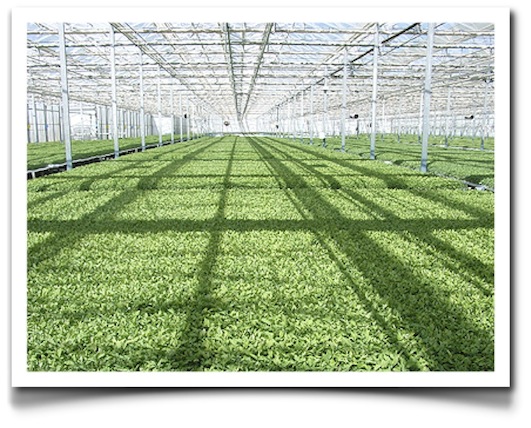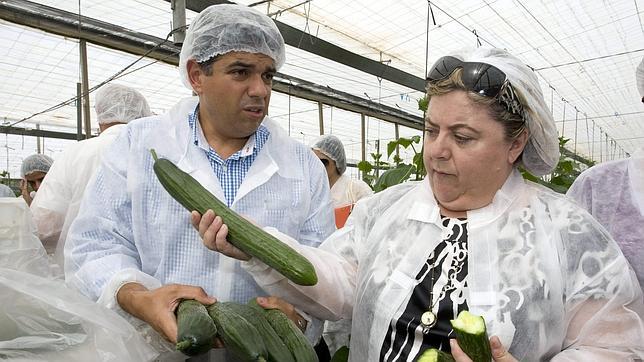With cucumbers have experienced the crisis of stereotypes: the course rigor, seriousness and high technology Germanic, compared to the infamous
“l’Afrique commence aux Pyrénées” with Spain to qualify those who want to see in it little more than a sunny country where holiday.
And as such stereotypes, they have failed miserably. From side to side. The so-called "crisis of cucumbers" has served, unfortunately to a very high economic cost to put many things in place, to check precisely the same stereotypes in the impact of technology.
First, start by denouncing the actions of someone who certainly has a major component responsible for this crisis: the minister of Health of the city-state of Hamburg, Prüfer-Storcks Cornelia, one of those "political career", completely devoid of qualifications for the position it occupies. Order the closure of borders and the withdrawal of Spanish cucumbers by "containing E. coli "is proof that you do not have the foggiest idea of what is E. coli or what it represents. By the same logic, this lady should have looked inside, sure that she "contained E. coli (a bacterium almost ubiquitous we do not think the differences between strains) and prudently withdrawn from circulation to avoid greater evils. Escherichia coli is a bacterium present almost everywhere: in our gut, in the irrigation water on the beaches ... it is the responsibility of the uncomfortable colitis, the most studied bacteria to man. Saying "Spanish cucumbers were removed because they contained E.coli" without further explanation and without taking over the infection came from a particular strain of the bacteria is so absurd, so weak justification and so banal, that for the same rule of three should have removed all agricultural products for sale in Germany, starting with those from Germany itself.
The worst thing that can make someone who has a public office is behaving irresponsibly, and so this person as the German Minister of Agriculture and Consumer Protection, Ilse Aigner, who even today continues to uphold its unjustifiable decision are a clear demonstration that the German authorities simply have not kept pace. First myth, that of the rigor and seriousness, germana, on the floor. And first evidence that, of course, must respond to the huge error compensation to which they exist.
Second myth: can we say today that Africa is beginning in the Pyrenees? It is going to be no. Furthermore, we are in a position to prove precisely the opposite. Technologically, the Spanish agriculture, and in particular that developed in southern Spain, is among the world's leading, trend-setter in every respect, is of course light years away from that developed in Germany in all way, including such important areas as health and sustainability.
Intensive greenhouse agriculture taking place in Southern Spain is the most advanced combination of technology and nature has been generated so far. Could be described as the true state of the art "with a balance in terms of productivity, sustainability, cost, employment generation and environmental impact is absolutely none. Abandon the topics surrounding the sector and country, and focus on the data: after several decades of continuous experimentation, we talk about an industry with high levels of control and traceability over existing anywhere in the world: to investigate precisely Pepino the recent crisis, we could check. In a few hours after the first alarm, the Spanish authorities were duly informed of the exact operation that had left each batch of cucumbers subject of the alert (unfair). However, when trying to follow his march through the distribution chain, traceability is lost. Where? Precisely in Germanic lands. Not only that, but the Germans laboratories that were supposed to grow, sequence and identify E. coli strain responsible for the poisoning were manifestly incapable of doing so. Again, the myth of control and accuracy germana, on the floor.
Let data: at present, cultivation under plastic is the most sustainable way of producing vegetables. Few cases better balance between intensive farming. 44% of the over thirty thousand hectares devoted to cultivation under plastic in Andalusia are organically grown, in percentages ranging from 100% in the case of peppers, 25% for tomatoes or zucchini. Crops that rely on biological control using insects instead of pesticides, with a massive reduction in fertilizer use for the benefit of natural composting systems, a radical optimizing the use of irrigation water, a very high and rigorous standards for certification and inspection in processes of farmers, and even a significant reduction in carbon footprint thanks to the agricultural practice. For a comprehensive characterization of horticultural exploitation of the area, can be used for studies such as that conducted by the Foundation for Agricultural Research in the province of Almeria and Cajamar Foundation.
Annually, we produce in greenhouses Andalusian about 2,500 million kilos of vegetables. 65% of them are destined for consumption abroad, notably Germany, France and England. Andalusia has become, thanks largely to the responsible use of technology in the real garden of Europe, far surpassing the old scheme aimed at the location of primary and extractive activities in countries with economies typically depressed and low cost Unit labor. In some years, it is possible that agriculture in many parts of the world, including Germany's course, begin to reach the level of productivity, eco-sustainability, control, traceability and certification on today is the Andalusian agriculture. Meanwhile, that letting go of myths. And above all, to be learning.
The Minister of Agriculture of Andalusia, Clara Aguilera, yesterday visited a farm in cucumbers.










